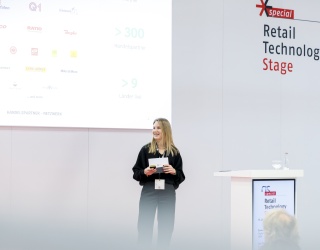
Ximena Carrión Granda, a Food Engineering graduate from Ecuador, has developed edible coatings containing natural substances with antimicrobial properties in order to extend the shelf-life of fish and seafood products by two to four days due to the reduction of the growth rate of the spoilage microorganisms. This work was developed at the Department of Food Technology of the Public University of Navarre (UPNA) as part of her doctoral thesis.
“The edible films and coatings are fine, and continuous layers of edible material placed on food surfaces or separating different phases of a food system to increase product quality, extend the shelf-life or improve food safety”, Carrión Granda explains. Her doctoral thesis was supervised by Professor Juan I. Maté Caballero (UPNA) and Professor Jordi Rovira Carballido (University of Burgos).
These coatings create “a barrier between the product and the surrounding atmosphere. This way, the food is protected, preventing humidity loss, reducing fat oxidation, controlling discolouration and preserving food quality and properties," Ximena Carrión says. "In addition, the edible coatings can act as carriers of additives such as antioxidants, mineral salts or antimicrobial agents that could reduce the growth of microorganisms on product surfaces”.
Emerging Technologies
Research on edible coatings has undergone considerable impulse over the last few years, given the changes in the lifestyle of consumers, who demand “fresh products with minimal processing and no synthetic additives that can last as long as possible and are convenient to prepare”. The food industry requires emerging technologies to increase food shelf life and offer safe products. This is the case with fish and seafood, given their dietary importance (only in 2014 in Spain, 554,000 tonnes of fresh fish were consumed), being “an excellent source of proteins, vitamins, minerals and polyunsaturated fats. Nevertheless, they are extremely perishable products, even more than red meat or chicken, due to their high surface humidity and free amino acid content. The spoilage process begins with loss of texture and the production of putrid odours basically caused by the development of microorganisms”, Ximena Carrión points out. Hence, the edible antimicrobial coatings are considered “an emerging technology suitable for controlling the microbiological deterioration of fish and seafood”.
Ximena Carrión developed edible films and coatings based on whey protein isolate and chitosan, a polysaccharide extracted from chitin, a structural element found in the shells of crustaceans (crabs, shrimps and lobsters). Using these, she formed coatings that were “insoluble and colourless”, to which she added “different antimicrobial agents that are gradually released on the fish and seafood surfaces, reducing the growth rate at which deteriorating microorganisms grow, therefore extending the shelf-life”.
Since the food market currently tends towards the consumption of food without synthetic preservatives, she used natural substances with antimicrobial properties, such as essential oils (from thyme and rosemary), plant extracts (from sage, oregano, garlic and rosemary) and lactic acid bacteria (L. plantarum, L. lactis and W. confusa).
These compounds were combined at different concentrations into whey protein and chitosan films and their antimicrobial activity was assessed against fourteen bacterial strains related to the spoilage and pathogenicity of fish and seafood. “The best formulations were used to assess the effect on microbial development in fresh tuna and hake fillets and peeled shrimp tails, packaged with and without air –using modified atmosphere– and stored in refrigeration for different periods of time”, the new doctor explained.
Her results showed that the films containing oregano and thyme essential oils and the extract of rosemary yielded the greatest antimicrobial effect in vitro against pathogenic bacteria (A. hydrophila, L. monocytogenes or S. Typhimurium) and deteriorating bacteria (V. alginolyticus or S. putrefaciens). On application to the different types of fish and seafood, the edible coatings were effective in retarding microbial growth and increasing the shelf-life of the treated products by two to four days. Moreover, the films containing lactic acid bacteria were successfully evaluated in vitro against L. monocytogenes.









